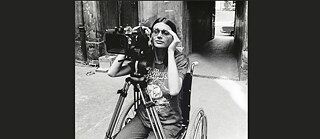Event series
Claudia von Alemann

The Essay Film Festival and the Goethe-Institut London in collaboration with the ICA present a programme of screenings and discussions dedicated to the work of German filmmaker Claudia von Alemann.
The focus is on three films dealing with the writing of early feminist histories in France and Germany and the work of women filmmakers. The screenings include the restoration of Alemann’s first feature film, Blind Spot (1981) and two other films shown in the UK for the first time, The Next Century Will Be Ours (1986/87), and the video-essay Bright Nights (1988).
Claudia von Alemann will be in conversation after the screenings at the ICA and the Goethe-Institut London.
Claudia von Alemann was born in Seebach, Germany. She studied art history and sociology at the Freie Universität Berlin and film at the Ulm School of Design. Her early documentaries deal with international political issues, with films covering such topics as May 1968, Kathleen and Eldridge Cleaver’s time in Algeria, the efforts of women in the Vietnam war, and the exploitation of female factory workers in West Germany. In 1973 she co-organised, with Helke Sander, the First International Women’s Film Festival at the Kino Arsenal, Berlin. She pursued a fascinating career in publishing, translating, teaching and as a freelance filmmaker, author and independent producer, continuing to experiment in different forms and mediums, directing feature films, experimental videos, and documentaries. These include feature films like Blind Spot (Die Reise nach Lyon, 1981) and The Next Century Will be Ours (Das Nächste Jahrhundert wird uns gehören, 1986/87), the essay film Bright Nights (Nuits Claires, Lichte Nächte, 1988), the video work The Women’s Room (Das Frauenzimmer, 1981, (part of several video-art collections, including MoMA), and documentary portraits of artists such as Ariane Mnouchkine and the photographer Abisag Tüllmann.
With special thanks to Claudia von Alemann, and acknowledging the support of the Deutsche Kinemathek, Haus der Kulturen der Welt, and Hessischer Rundfunk.
The focus is on three films dealing with the writing of early feminist histories in France and Germany and the work of women filmmakers. The screenings include the restoration of Alemann’s first feature film, Blind Spot (1981) and two other films shown in the UK for the first time, The Next Century Will Be Ours (1986/87), and the video-essay Bright Nights (1988).
Claudia von Alemann will be in conversation after the screenings at the ICA and the Goethe-Institut London.
Claudia von Alemann was born in Seebach, Germany. She studied art history and sociology at the Freie Universität Berlin and film at the Ulm School of Design. Her early documentaries deal with international political issues, with films covering such topics as May 1968, Kathleen and Eldridge Cleaver’s time in Algeria, the efforts of women in the Vietnam war, and the exploitation of female factory workers in West Germany. In 1973 she co-organised, with Helke Sander, the First International Women’s Film Festival at the Kino Arsenal, Berlin. She pursued a fascinating career in publishing, translating, teaching and as a freelance filmmaker, author and independent producer, continuing to experiment in different forms and mediums, directing feature films, experimental videos, and documentaries. These include feature films like Blind Spot (Die Reise nach Lyon, 1981) and The Next Century Will be Ours (Das Nächste Jahrhundert wird uns gehören, 1986/87), the essay film Bright Nights (Nuits Claires, Lichte Nächte, 1988), the video work The Women’s Room (Das Frauenzimmer, 1981, (part of several video-art collections, including MoMA), and documentary portraits of artists such as Ariane Mnouchkine and the photographer Abisag Tüllmann.
With special thanks to Claudia von Alemann, and acknowledging the support of the Deutsche Kinemathek, Haus der Kulturen der Welt, and Hessischer Rundfunk.